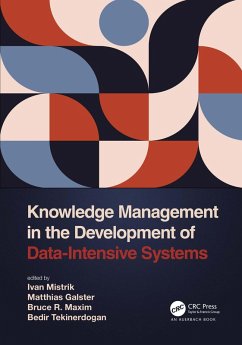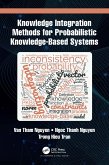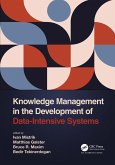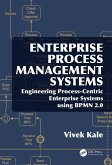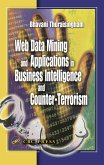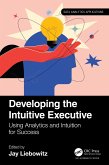Knowledge Management in the Development of Data-Intensive Systems (eBook, PDF)
Redaktion: Mistrik, Ivan; Tekinerdogan, Bedir; Maxim, Bruce R.; Galster, Matthias
54,95 €
54,95 €
inkl. MwSt.
Sofort per Download lieferbar

27 °P sammeln
54,95 €
Als Download kaufen

54,95 €
inkl. MwSt.
Sofort per Download lieferbar

27 °P sammeln
Jetzt verschenken
Alle Infos zum eBook verschenken
54,95 €
inkl. MwSt.
Sofort per Download lieferbar
Alle Infos zum eBook verschenken

27 °P sammeln
Knowledge Management in the Development of Data-Intensive Systems (eBook, PDF)
Redaktion: Mistrik, Ivan; Tekinerdogan, Bedir; Maxim, Bruce R.; Galster, Matthias
- Format: PDF
- Merkliste
- Auf die Merkliste
- Bewerten Bewerten
- Teilen
- Produkt teilen
- Produkterinnerung
- Produkterinnerung

Bitte loggen Sie sich zunächst in Ihr Kundenkonto ein oder registrieren Sie sich bei
bücher.de, um das eBook-Abo tolino select nutzen zu können.
Hier können Sie sich einloggen
Hier können Sie sich einloggen
Sie sind bereits eingeloggt. Klicken Sie auf 2. tolino select Abo, um fortzufahren.

Bitte loggen Sie sich zunächst in Ihr Kundenkonto ein oder registrieren Sie sich bei bücher.de, um das eBook-Abo tolino select nutzen zu können.
This book explores the application of established software engineering knowledge and practices to developing big data systems, enhanced with dedicated knowledge management during software development. It looks at explicit knowledge construction and management and system development as a process of social construction of shared knowledge.
- Geräte: PC
- mit Kopierschutz
- eBook Hilfe
Andere Kunden interessierten sich auch für
![Knowledge Integration Methods for Probabilistic Knowledge-based Systems (eBook, PDF) Knowledge Integration Methods for Probabilistic Knowledge-based Systems (eBook, PDF)]() Van Tham NguyenKnowledge Integration Methods for Probabilistic Knowledge-based Systems (eBook, PDF)47,95 €
Van Tham NguyenKnowledge Integration Methods for Probabilistic Knowledge-based Systems (eBook, PDF)47,95 €![Knowledge Management in the Development of Data-Intensive Systems (eBook, ePUB) Knowledge Management in the Development of Data-Intensive Systems (eBook, ePUB)]() Knowledge Management in the Development of Data-Intensive Systems (eBook, ePUB)54,95 €
Knowledge Management in the Development of Data-Intensive Systems (eBook, ePUB)54,95 €![Enterprise Process Management Systems (eBook, PDF) Enterprise Process Management Systems (eBook, PDF)]() Vivek KaleEnterprise Process Management Systems (eBook, PDF)173,95 €
Vivek KaleEnterprise Process Management Systems (eBook, PDF)173,95 €![Developing Informed Intuition for Decision-Making (eBook, PDF) Developing Informed Intuition for Decision-Making (eBook, PDF)]() Jay LiebowitzDeveloping Informed Intuition for Decision-Making (eBook, PDF)47,95 €
Jay LiebowitzDeveloping Informed Intuition for Decision-Making (eBook, PDF)47,95 €![Web Data Mining and Applications in Business Intelligence and Counter-Terrorism (eBook, PDF) Web Data Mining and Applications in Business Intelligence and Counter-Terrorism (eBook, PDF)]() Bhavani ThuraisinghamWeb Data Mining and Applications in Business Intelligence and Counter-Terrorism (eBook, PDF)141,95 €
Bhavani ThuraisinghamWeb Data Mining and Applications in Business Intelligence and Counter-Terrorism (eBook, PDF)141,95 €![Developing the Intuitive Executive (eBook, PDF) Developing the Intuitive Executive (eBook, PDF)]() Developing the Intuitive Executive (eBook, PDF)50,95 €
Developing the Intuitive Executive (eBook, PDF)50,95 €![Confessions of an Enterprise Architect (eBook, PDF) Confessions of an Enterprise Architect (eBook, PDF)]() Charles F. BowmanConfessions of an Enterprise Architect (eBook, PDF)48,95 €
Charles F. BowmanConfessions of an Enterprise Architect (eBook, PDF)48,95 €-
-
-
This book explores the application of established software engineering knowledge and practices to developing big data systems, enhanced with dedicated knowledge management during software development. It looks at explicit knowledge construction and management and system development as a process of social construction of shared knowledge.
Dieser Download kann aus rechtlichen Gründen nur mit Rechnungsadresse in A, B, BG, CY, CZ, D, DK, EW, E, FIN, F, GR, HR, H, IRL, I, LT, L, LR, M, NL, PL, P, R, S, SLO, SK ausgeliefert werden.
Produktdetails
- Produktdetails
- Verlag: Taylor & Francis eBooks
- Seitenzahl: 342
- Erscheinungstermin: 15. Juni 2021
- Englisch
- ISBN-13: 9781000387414
- Artikelnr.: 61610650
- Verlag: Taylor & Francis eBooks
- Seitenzahl: 342
- Erscheinungstermin: 15. Juni 2021
- Englisch
- ISBN-13: 9781000387414
- Artikelnr.: 61610650
- Herstellerkennzeichnung Die Herstellerinformationen sind derzeit nicht verfügbar.
William G. Doerner is a retired Professor of Criminology and Criminal Justice at Florida State University, where he served since 1977. A specialist in victimology and law enforcement issues, he holds a Ph.D. in Sociology from the University of Tennessee. Doerner retired from active duty with the Tallahassee Police Department after 29 years of service as a part-time sworn law enforcement officer. He served on the Board of Directors for the National Organization of Victim Assistance and was the Founding President of the Florida Network of Victim/Witness Services, past Director of the Program in Criminal Justice at Florida State University, and a previous editor of the American Journal of Criminal Justice. In addition to other professional accolades, Doerner received the Outstanding Educator of the Year Award from the Southern Criminal Justice Association and was a winner of the John P.J. Dussich Award from the American Society of Victimology. Steven P. Lab is Professor of Criminal Justice at Bowling Green State University. He holds a Ph.D. in Criminology from the Florida State University School of Criminology and Criminal Justice. Lab is the author or co-author of five books, co-editor of one encyclopedia, and the author of more than 50 articles or book chapters. He is a past editor of the Journal of Crime and Justice. Lab has been a visiting professor at the Jill Dando Institute of Crime Science of the University College London and at Keele University in Staffordshire, England, as well as a Visiting Fellow at Loughborough University (England) and a Research Consultant with the Perpetuity Research Group at Leicester University (England). Lab has received grant funding for several large research projects from the National Institute of Justice and has served as a consultant to the Ohio Attorney General's Office, the Arizona Governor's Office, and various offices of the U.S. Department of Justice. Lab is also a past president of the Academy of Criminal Justice Sciences.
Chapter 1: Data-Intensive Systems, Knowledge Management, and Software
Engineering. PART I: CONCEPTS AND MODELS. Chapter 2: Software Artifact
Traceability in Big Data Systems. Chapter 3: Architecting Software Model
Management and Analytics Framework. Chapter 4: Variability in
Data-Intensive Systems from an Architecture Perspective. PART II: KNOWLEDGE
DISCOVERY AND MANAGEMENT. Chapter 5: Knowledge Management via
Human-Centric, Domain-Specific Visual Languages for Data-Intensive Software
Systems. Chapter 6: Augmented Analytics for Datamining: A Formal Framework
and Methodology. Chapter 7: Mining and Managing Big Data Refactoring for
Design Improvement. Are We There Yet?. Chapter 8: Knowledge Discovery in
Systems-of-Systems: Observations and Trends. PART III: CLOUD SERVICES FOR
DATA-INTENSIVE SYSTEMS. Chapter 9: The Challenging Landscape of
Cloud-Monitoring. Chapter 10: Machine Learning as a Service for Software
Application Categorization. Chapter 11: Workflow-as-a-Service Cloud
Platform and Deployment of Bioinformatics Workflow Applications. PART IV:
CASE STUDIES. Chapter 12: Instrumentation and Control for Real Time
Decisions in Software Applications: Findings and Knowledge Management
Considerations. Chapter 13: Industrial Evaluation of An Architectural
Assumption Documentation Tool: A Case Study.
Engineering. PART I: CONCEPTS AND MODELS. Chapter 2: Software Artifact
Traceability in Big Data Systems. Chapter 3: Architecting Software Model
Management and Analytics Framework. Chapter 4: Variability in
Data-Intensive Systems from an Architecture Perspective. PART II: KNOWLEDGE
DISCOVERY AND MANAGEMENT. Chapter 5: Knowledge Management via
Human-Centric, Domain-Specific Visual Languages for Data-Intensive Software
Systems. Chapter 6: Augmented Analytics for Datamining: A Formal Framework
and Methodology. Chapter 7: Mining and Managing Big Data Refactoring for
Design Improvement. Are We There Yet?. Chapter 8: Knowledge Discovery in
Systems-of-Systems: Observations and Trends. PART III: CLOUD SERVICES FOR
DATA-INTENSIVE SYSTEMS. Chapter 9: The Challenging Landscape of
Cloud-Monitoring. Chapter 10: Machine Learning as a Service for Software
Application Categorization. Chapter 11: Workflow-as-a-Service Cloud
Platform and Deployment of Bioinformatics Workflow Applications. PART IV:
CASE STUDIES. Chapter 12: Instrumentation and Control for Real Time
Decisions in Software Applications: Findings and Knowledge Management
Considerations. Chapter 13: Industrial Evaluation of An Architectural
Assumption Documentation Tool: A Case Study.
Chapter 1: Data-Intensive Systems, Knowledge Management, and Software
Engineering. PART I: CONCEPTS AND MODELS. Chapter 2: Software Artifact
Traceability in Big Data Systems. Chapter 3: Architecting Software Model
Management and Analytics Framework. Chapter 4: Variability in
Data-Intensive Systems from an Architecture Perspective. PART II: KNOWLEDGE
DISCOVERY AND MANAGEMENT. Chapter 5: Knowledge Management via
Human-Centric, Domain-Specific Visual Languages for Data-Intensive Software
Systems. Chapter 6: Augmented Analytics for Datamining: A Formal Framework
and Methodology. Chapter 7: Mining and Managing Big Data Refactoring for
Design Improvement. Are We There Yet?. Chapter 8: Knowledge Discovery in
Systems-of-Systems: Observations and Trends. PART III: CLOUD SERVICES FOR
DATA-INTENSIVE SYSTEMS. Chapter 9: The Challenging Landscape of
Cloud-Monitoring. Chapter 10: Machine Learning as a Service for Software
Application Categorization. Chapter 11: Workflow-as-a-Service Cloud
Platform and Deployment of Bioinformatics Workflow Applications. PART IV:
CASE STUDIES. Chapter 12: Instrumentation and Control for Real Time
Decisions in Software Applications: Findings and Knowledge Management
Considerations. Chapter 13: Industrial Evaluation of An Architectural
Assumption Documentation Tool: A Case Study.
Engineering. PART I: CONCEPTS AND MODELS. Chapter 2: Software Artifact
Traceability in Big Data Systems. Chapter 3: Architecting Software Model
Management and Analytics Framework. Chapter 4: Variability in
Data-Intensive Systems from an Architecture Perspective. PART II: KNOWLEDGE
DISCOVERY AND MANAGEMENT. Chapter 5: Knowledge Management via
Human-Centric, Domain-Specific Visual Languages for Data-Intensive Software
Systems. Chapter 6: Augmented Analytics for Datamining: A Formal Framework
and Methodology. Chapter 7: Mining and Managing Big Data Refactoring for
Design Improvement. Are We There Yet?. Chapter 8: Knowledge Discovery in
Systems-of-Systems: Observations and Trends. PART III: CLOUD SERVICES FOR
DATA-INTENSIVE SYSTEMS. Chapter 9: The Challenging Landscape of
Cloud-Monitoring. Chapter 10: Machine Learning as a Service for Software
Application Categorization. Chapter 11: Workflow-as-a-Service Cloud
Platform and Deployment of Bioinformatics Workflow Applications. PART IV:
CASE STUDIES. Chapter 12: Instrumentation and Control for Real Time
Decisions in Software Applications: Findings and Knowledge Management
Considerations. Chapter 13: Industrial Evaluation of An Architectural
Assumption Documentation Tool: A Case Study.
